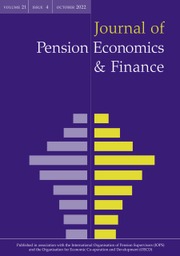Article contents
Pension funds and value-based generational accounting
Published online by Cambridge University Press: 15 January 2004
Abstract
The raison d'être of wage-indexed defined benefit pension funds is to provide insurance against standard-of-living risk after retirement, based on intergenerational risk sharing. Pension funds necessarily have to accept mismatch risk in providing this kind of insurance. Mismatch risk taken by the pension fund is risk for the fund's stakeholders. We combine the value-based approach and the method of generational accounting to analyze the economic value of the stakes of the different generations and the issue of who gains and who loses (transfers of value between generations) from alternative funding and indexation policies. Rules concerning the allocation of a funding surplus or funding shortage in particular are decisive to the direction and to the size of transfers of value between stakeholders. We put forward two criteria to evaluate alternative policies employed by pension funds: the funding policy and allocation rules must give an ex ante fair compensation for risk taken by generations and the sustainability of a pension plan must be checked with respect to ex post redistributive effects for current and future generations. Value-based generational accounting provides a tool for testing a pension fund policy for these two criteria.
- Type
- Research Article
- Information
- Copyright
- © 2003 Cambridge University Press
- 34
- Cited by




